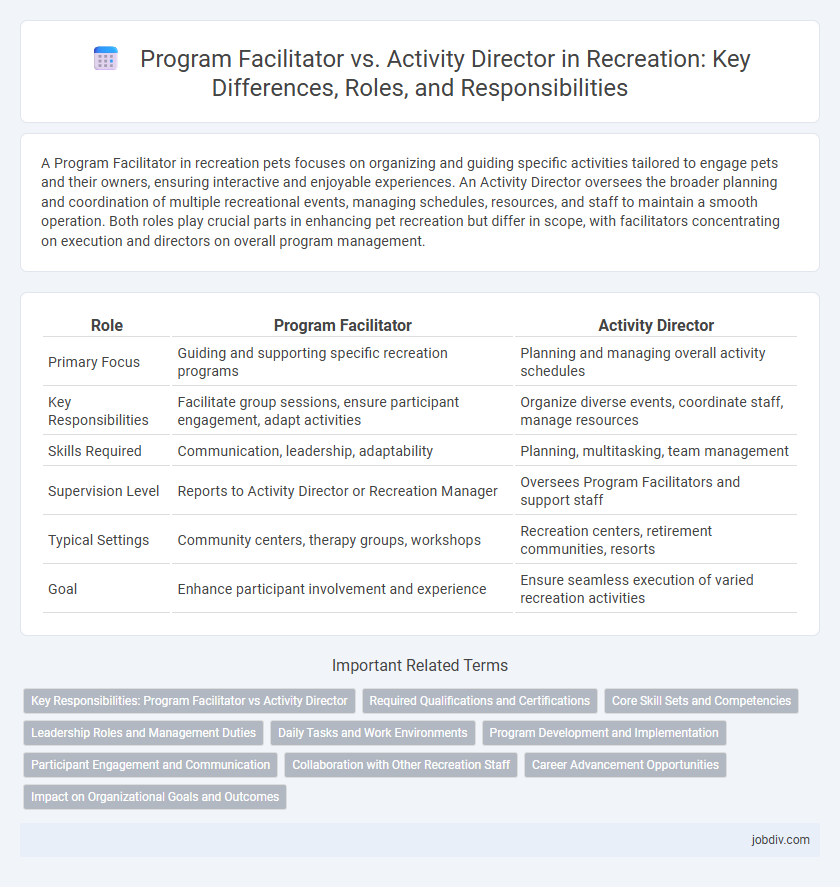A Program Facilitator in recreation pets focuses on organizing and guiding specific activities tailored to engage pets and their owners, ensuring interactive and enjoyable experiences. An Activity Director oversees the broader planning and coordination of multiple recreational events, managing schedules, resources, and staff to maintain a smooth operation. Both roles play crucial parts in enhancing pet recreation but differ in scope, with facilitators concentrating on execution and directors on overall program management.
Table of Comparison
| Role | Program Facilitator | Activity Director |
|---|---|---|
| Primary Focus | Guiding and supporting specific recreation programs | Planning and managing overall activity schedules |
| Key Responsibilities | Facilitate group sessions, ensure participant engagement, adapt activities | Organize diverse events, coordinate staff, manage resources |
| Skills Required | Communication, leadership, adaptability | Planning, multitasking, team management |
| Supervision Level | Reports to Activity Director or Recreation Manager | Oversees Program Facilitators and support staff |
| Typical Settings | Community centers, therapy groups, workshops | Recreation centers, retirement communities, resorts |
| Goal | Enhance participant involvement and experience | Ensure seamless execution of varied recreation activities |
Key Responsibilities: Program Facilitator vs Activity Director
Program Facilitators design and implement specific recreational programs tailored to participant interests, ensuring engaging and skill-building activities that promote social interaction and personal development. Activity Directors oversee the broader recreation schedule, coordinating multiple programs and managing staff to enhance overall community engagement and facility utilization. Both roles require strong leadership and communication skills, but Program Facilitators focus on direct participant involvement while Activity Directors emphasize strategic planning and operational management.
Required Qualifications and Certifications
Program Facilitators typically require a bachelor's degree in recreation, education, or a related field, along with certifications such as CPR and First Aid to ensure participant safety. Activity Directors often need advanced certifications, including Certified Recreation Therapist (CRT) or National Certified Activity Professional (NCAP), reflecting their leadership role in managing programs and staff. Both roles benefit from strong communication and organizational skills, but Activity Directors usually have more extensive experience and higher-level qualifications.
Core Skill Sets and Competencies
Program Facilitators excel in communication, group engagement, and adaptability, ensuring activities are inclusive and participant-focused. Activity Directors demonstrate strong leadership, strategic planning, and resource management skills to design comprehensive recreational programs. Both roles require creativity and problem-solving abilities but differ in scope, with Facilitators emphasizing direct interaction and Directors focusing on program oversight.
Leadership Roles and Management Duties
Program Facilitators lead the design and execution of specific recreational activities, focusing on participant engagement and ensuring safety protocols. Activity Directors oversee the broader management of multiple programs, including scheduling, staffing, budgeting, and compliance with regulations. Both roles require strong leadership skills, but Activity Directors carry greater administrative responsibilities and strategic planning duties.
Daily Tasks and Work Environments
Program Facilitators design and lead specific recreational activities, ensuring participant engagement and safety in community centers, schools, or wellness facilities. Activity Directors oversee multiple programs, managing staff schedules, budgeting, and compliance within larger institutions like senior living communities or recreational departments. Both roles require strong organizational skills, but Activity Directors focus more on administrative duties while Program Facilitators emphasize direct interaction with participants.
Program Development and Implementation
Program Facilitators specialize in designing and executing specific recreational activities, ensuring participant engagement and adherence to established guidelines. Activity Directors oversee the broader program development process, coordinating multiple activities, managing budgets, and evaluating overall effectiveness to meet organizational goals. Both roles require strong leadership skills but differ in scope, with Activity Directors focusing on strategic planning and Program Facilitators on hands-on implementation.
Participant Engagement and Communication
Program Facilitators foster participant engagement by actively guiding activities and encouraging involvement through clear, motivating communication tailored to diverse group needs. Activity Directors focus on overarching communication strategies and program development, ensuring activities align with organizational goals and participant interests to maximize engagement. Both roles require strong interpersonal skills, but Facilitators emphasize direct interaction, while Directors prioritize coordination and communication flow.
Collaboration with Other Recreation Staff
Program Facilitators focus on designing and implementing specific recreational activities, working closely with recreation staff to tailor programs that meet participant needs and enhance engagement. Activity Directors oversee the coordination of multiple recreation programs, collaborating with various team members to ensure smooth operations and resource allocation. Both roles require strong communication and teamwork skills to create a cohesive recreational environment that supports participant satisfaction and organizational goals.
Career Advancement Opportunities
Program Facilitators typically gain hands-on experience leading specific recreational activities, making them well-suited for roles requiring direct participant interaction and skill development. Activity Directors oversee multiple programs and manage staff, budgets, and strategic planning, offering broader leadership opportunities and pathways to higher administrative positions. Career advancement for Program Facilitators often involves moving into supervisory roles, while Activity Directors may progress into recreation management or community services leadership.
Impact on Organizational Goals and Outcomes
Program Facilitators directly engage participants in activities, ensuring effective delivery and enhancing satisfaction, which drives improved program outcomes. Activity Directors oversee the development and strategic planning of recreational programs, aligning them with organizational goals to maximize participant engagement and resource utilization. Both roles collaboratively contribute to organizational success by balancing hands-on execution with long-term program vision and operational efficiency.
Program Facilitator vs Activity Director Infographic

 jobdiv.com
jobdiv.com